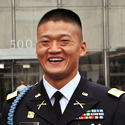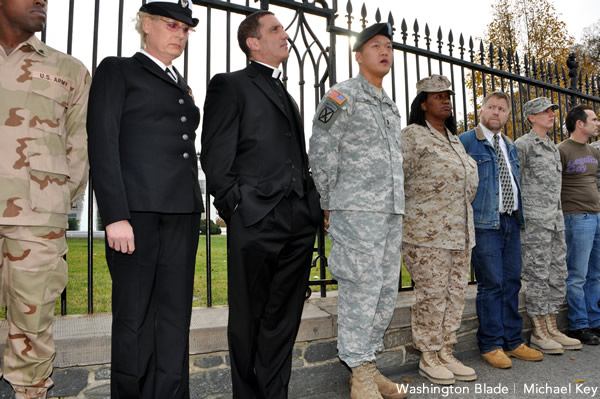Local
Choi trial opens with clash over White House protest rules
Defense to argue that activist didn’t break the law


Dan Choi and 12 other LGBT activists attracted national media attention on Nov. 15, 2010, when they handcuffed themselves to the White House fence.
A lawyer representing gay former Army Lt. Dan Choi questioned five U.S. Park Police officers Monday over the validity of their decision to arrest Choi last November after he handcuffed himself to the White House fence to protest the “Don’t Ask, Don’t Tell” law.
Defense attorney Robert Feldman asked the questions while cross-examining the officers during the first day of Choi’s trial at U.S. District Court for the District of Columbia. Choi faces a possible sentence of six months in jail or a $5,000 fine if convicted on a misdemeanor charge of disobeying a lawful order to disengage from the fence.
Magistrate Judge John Facciola is presiding over the trial, which was expected to continue through Tuesday and possibly part of the day on Wednesday.
Choi and 12 other LGBT activists attracted national media attention on Nov. 15, 2010, when they handcuffed themselves to the White House fence. About 75 supporters who assembled across the street in Lafayette Park cheered and chanted slogans for LGBT equality while Park Police removed the handcuffs with cable cutters and placed Choi and the other protesters under arrest.
In May of this year, the 12 others who were arrested agreed to a government offer to plead guilty to the charge in exchange for the government dismissing the case against them in six months if the activists don’t get arrested during that period for any reason, including a similar civil disobedience protest.
Choi told reporters at a news conference outside the federal courthouse Monday, after the trial recessed for the day, that he rejected the government’s plea bargain offer because he believes the law and regulation used to arrest him is unconstitutional.
“I believe there is no law that, in the history of this country, abridges freedom of speech, assembly, or the right to protest for redress of grievances, which were clear and made plain by all of the defendants,” he said.
Assistant U.S. Attorney Angela George, the prosecutor in the case, called five Park Police officers and a U.S. Park Ranger as government witnesses on Monday. Under questioning from George, they testified that they had no intention of singling out the protesters for their political beliefs or because of their sexual orientation.
Feldman released an e-mail sent to the defense on Friday by George that extended another offer for Choi to plead guilty to the charge in exchange for the dismissal of the case by the government if Choi refrained from getting arrested for the next four months.
Feldman said Choi responded by saying he would accept the offer only on condition that the government issue a public apology to Choi in court on Monday for the arrest and prosecution against him. Feldman said the government rejected the conditions, prompting Choi to turn down the offer.
A spokesperson for the U.S. Attorney’s office said the office would have no comment on the case while the trial is in progress.
Park Police Lt. Robert Lachance, who led a team of officers assigned to arrest the protesters, testified that an assistant solicitor general at the Department of Interior, which has jurisdiction over the Park Police, advised him that the act of chaining oneself to the White House fence violated a federal regulation against actions that pose a threat to public safety, obstruct traffic, and potentially prevent “emergency responders” from carrying out their work.
At the news conference, Feldman said he plans to argue at the trial that Choi’s action at the White House fence did not violate the regulation and statute cited by the Park Police and by prosecutor George.
“It’s uncontroverted that Lt. Choi is no threat to the public safety whatsoever,” said Feldman. “Neither does he obstruct traffic, which is the second part of the regulation.”
Feldman said he would also argue that the regulation used by authorities to arrest Choi applies only to the sidewalk next to the White House fence. He noted that Choi and the other protesters were standing on a masonry ledge that rises above the sidewalk and serves as an anchor for the White House fence.
“It’s very clear that my client was never on the sidewalk,” Feldman said. “He was on the masonry fence, which is above the sidewalk. And the warnings from Lt. Lachance said, ‘Get off the sidewalk.’ How can you get off the sidewalk if you were never on the sidewalk?”
He said he would also argue that Choi was unable to hear the warning that Lachance made to the protesters through a loudspeaker brought to the scene by Park Police. Lachance testified that he read a scripted message three times ordering the protesters to leave the fence and warning them they would be arrested if they did not comply with that order.
Feldman said Lachance’s warnings were drowned out by loud shouts and chants by Choi and the other 12 protesters handcuffed to the fence as well as by dozens of other protesters assembled in Lafayette Park.
The chants and shouts could be heard in a video recording of the protest that George played in the courtroom as part of a prosecution exhibit for the trial.
“There’s a cacophony of noise all around, and how can you possibly hear Lt. Lachance’s warnings to go away?” Feldman said at the news conference.
He said Choi would testify at the trial as the lead defense witness. One other defense witness, gay activist and former military Capt. Jim Pietrangelo II, was also scheduled to testify, Feldman said.
District of Columbia
D.C. Black Pride theme, performers announced at ‘Speakeasy’
Durand Bernarr to headline 2026 programming

The Center for Black Equity held its 2026 DC Black Pride Theme Reveal event at Union Stage on Monday. The evening, a “Speakeasy Happy Hour,” was hosted by Anthony Oakes and featured performances by Lolita Leopard and Keith Angelo. The Center for Black Equity organizes DC Black Pride.
Kenya Hutton, Center for Black Equity president and CEO, spoke following the performances by Leopard and Angelo. Hutton announced this year’s theme for DC Black Pride: “New Black Renaissance.”
Performers for 2026 DC Black Pride were announced to be Bang Garcon, Be Steadwell, Jay Columbus, Bennu Byrd, Rue Pratt and Akeem Woods.
Singer-songwriter Durand Bernarr was announced as the headliner for the 2026 festivities. Bernerr gave brief remarks through a video played on the screen at the stage.
DC Black Pride is scheduled for May 22-25. For more information on DC Black Pride, visit dcblackpride.org.
Virginia
Arlington LGBTQ bar Freddie’s celebrates 25th anniversary
Owner asks public to support D.C.-area gay bars

An overflowing crowd turned out Sunday night, March 1, for the 25th anniversary celebration of Freddie’s Beach Bar, the LGBTQ bar and restaurant located in the Crystal City section of Arlington, Va.
The celebration began as longtime patrons sitting at tables and at the bar ordered drinks, snacks, and full meals as several of Freddie’s well-known drag queens performed on a decorated stage.
Roland Watkins, an official with Equality NoVa, an LGBTQ advocacy organization based in the Northern Virginia areas of Arlington, Alexandria, and Fairfax County, next told the gathering about the history of Freddie’s Beach Bar and the role he said that owner Freddie Lutz has played in broadening the bar’s role into a community gathering place.
“Twenty-five years ago, opening a gay bar in Arlington was not a given,” Watkins told the crowd from the stage. “It took courage, convincing, and a deep belief that our community belongs openly, visibly, and proudly,” he said. “And that belief came from Freddie.”
Watkins and others familiar with Freddie’s noted that under Lutz’s leadership and support from his staff, Freddie’s provided support and a gathering place for LGBTQ organizations and a place where Virginia elected officials, and candidates running for public office, came to express their support for the LGBTQ community.
“Over the past 25 years, Freddie’s has become more than a bar,” Watkins said. “It has become a community maker.”
Lutz, who spoke next, said he was moved by the outpouring of support from long-time customers. “Thank you all so much for coming tonight and thank you all so much for your support over the past 25 years,” he said. “I can’t tell you how much that means to me and how much it’s kept me going.”
But Lutz then said Freddie’s, like many other D.C. area gay bars, continues to face economic hard times that he said began during the COVID pandemic. He noted that fewer customers are coming to Freddie’s in recent years, with a significant drop in patronage for his once lucrative weekend buffet brunches.
“So, I don’t want to be the daddy downer on my 25-year anniversary,” he said. “But this was actually the worst year we’ve ever had,” he added. “And I guess what I’m asking is please help us out. Not just me, but all the gay bars in the area.” He added, “I’m reaching out and I’m appealing to you not to forget the gay bars.”
Lutz received loud, prolonged applause, with many customers hugging him as he walked off the stage.

In an official statement released at the reveal event Capital Pride Alliance described its just announced 2026 Pride theme of “Exist, Resist, Have the Audacity” as a “bold declaration affirming the presence, resilience, and courage of LGBTQ+ people around the world.”
The statement adds, “Grounded in the undeniable truth that our existence is not up for debate, this year’s theme calls on the community to live loudly and proudly, stand firm against injustice and erasure, and embody the collective strength that has always defined the LGBTQ+ community.”
In a reference to the impact of the hostile political climate, the statement says, “In a time when LGBTQ+ rights and history continue to face challenges, especially in our Nation’s Capital, where policy and public discourse shape the future of our country, together, we must ensure that our voices are visible, heard, and unapologetically centered.”
The statement also quotes Capital Pride Alliance CEO and President Ryan Bos’s message at the Reveal event: “This year’s theme is both a declaration and a demand,” Bos said. “Exist, Resist, Have Audacity! reflects the resilience of our community and our responsibility to protect the progress we’ve made. As we look toward our nation’s 250th anniversary, we affirm that LGBTQ+ people have always been and always will be part of the United States’s history, and we will continue shaping its future with strength and resolve,” he concluded.
-

 District of Columbia5 days ago
District of Columbia5 days agoCapital Pride board member resigns, alleges failure to address ‘sexual misconduct’
-

 India4 days ago
India4 days agoActivists push for better counting of transgender Indians in 2026 Census
-

 Advice4 days ago
Advice4 days agoDry January has isolated me from my friends
-

 District of Columbia4 days ago
District of Columbia4 days agoCapital Pride reveals 2026 theme



















